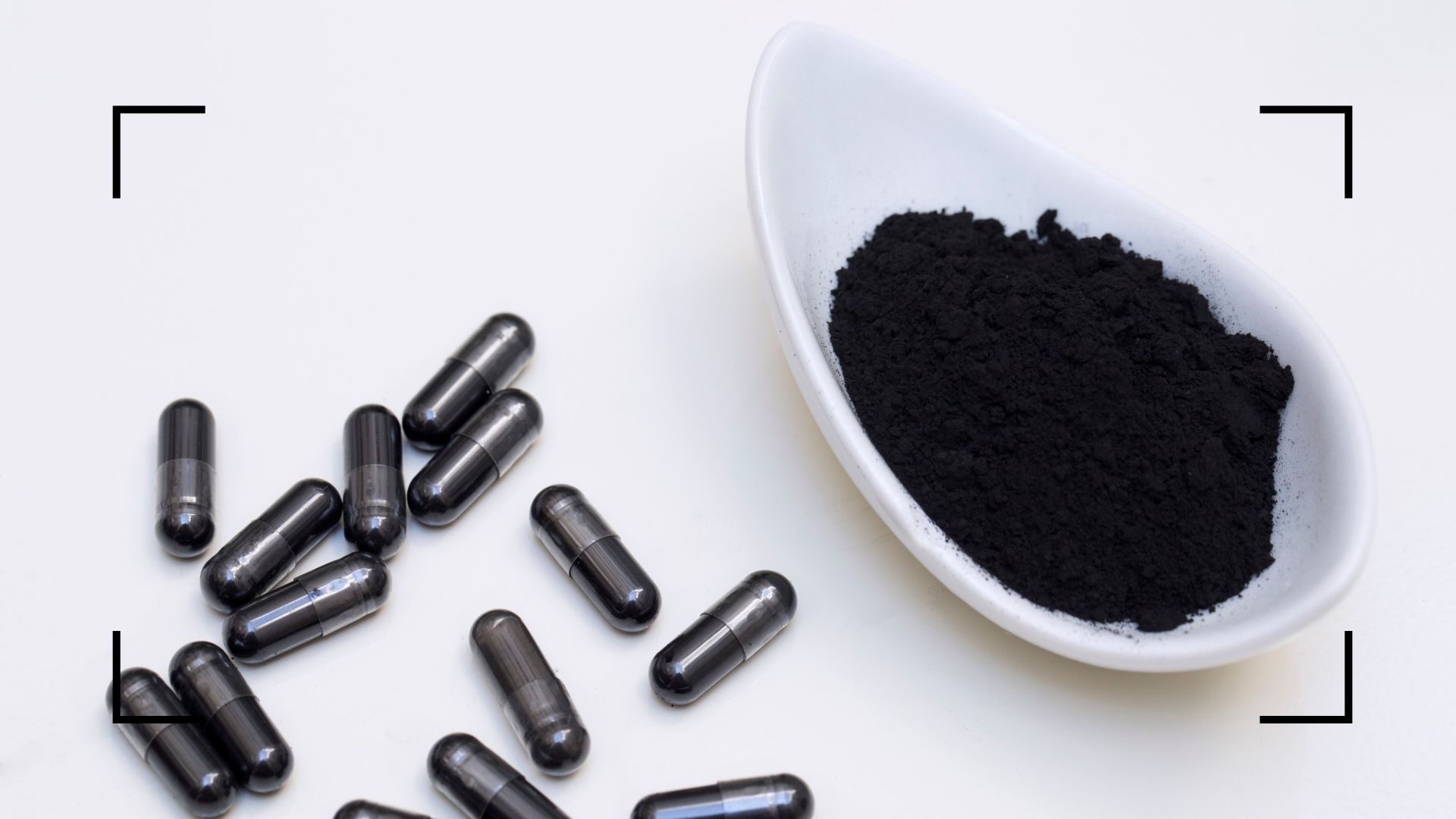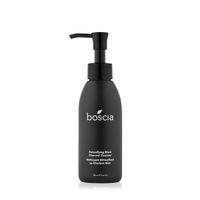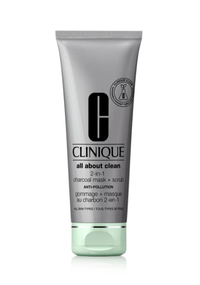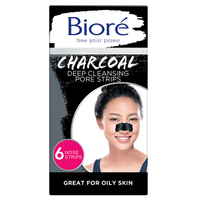What is activated charcoal and how does it work in beauty products?
How does activated charcoal benefit the body? See why this simple ingredient is so popular in detox circles


When activated charcoal hit the shelves, the dark gray bottles could have easily been another temporary trend. In reality, it has stuck around for the simple reason that many people have claimed it actually works.
You may see a lot of claims about activated charcoal as you scan beauty aisle shelves, but we're here to explain how it works and why it can be an important element in your skincare routine.
What is activated charcoal?
Activated charcoal is a fine black powder that appears in a wide range of beauty products, most often masks and cleansers. Similar to regular charcoal, activated charcoal is a carbon substance made of elements like peat, coconut shells, coal, and wood. Activated charcoal is specifically made of nontoxic substances so it is safe for human use.
"Activated charcoal has been a trendy ingredient in health and beauty because it has an enhanced, increases surface area and is very porous," says Dr. Rachel Nazarian, MD, of Schweiger Dermatology Group. "It has additional characteristics that allow it to trap and attract various substances when taken orally, making it an option used medically for various types of overdosing and poisoning," she adds.
What makes it different is how it is processed: Unlike the kind of charcoal you use for your grill, activated charcoal is heated at very high temperatures, which creates lots of pores on the charcoal's surface. It is these pores that allow it to absorb impurities and harmful chemicals due to its negative electric charge, which allows it to bind with positive electric charges in gas and toxins.
Activated charcoal benefits and uses
Activated charcoal was traditionally used as a poison antidote. Since the 1800s it has been administered for anything you (or a wayward child) consumed that shouldn't have gone into your system.
Nowadays, it's used as a natural treatment for a variety of ailments and concerns. It is a safe ingredient suitable for all skin types. It's even mild enough for sensitive skin—which explains why it's a popular ingredient in everything from the best facial exfoliators to pore strips and the best face masks.
Sign up to our free daily email for the latest royal and entertainment news, interesting opinion, expert advice on styling and beauty trends, and no-nonsense guides to the health and wellness questions you want answered.
Uses and benefits of activated charcoal include:
- For first aid: Activated charcoal can be administered orally to treat poisoning, as it can bind many drugs and toxins and reduce their effects, as well as help with overdoses of over-the-counter medication like aspirin and acetaminophen.
- For skin clearing: It is said to be highly effective in trapping and removing impurities in your skin by unclogging pores, removing dirt and oil, and sloughing off dead skin cells.
- For gas: It can be administered orally to prevent intestinal flatulence and feelings of indigestion and bloatedness.
- For teeth whitening: In moderation (as it is abrasive), activated charcoal powder is said to be able to remove surface stains on teeth.
Activated charcoal side effects
As with any new skincare product, it is a good idea to do a small patch test to see if you experience any negative reactions. Activated charcoal is considered safe, but some mild side effects may occur when used more often than directed, like temporary dryness and irritation of the skin.
When to use activated charcoal (and when not to)
Skin is exposed to a host of toxins daily. This can cause dirt and oil buildup in pores, both as a result of those toxins and your normal daily activities.
Dr. Nazarian says, "Charcoal itself has been used to minimize surface oil levels." This might lead to the implication that it can be beneficial to those prescribing to a skincare routine for acne, as most often, acne occurs because dead skin cells, oil, and bacteria get trapped inside your pores. If you struggle with acne, especially if you have acne triggered by certain products, adding active charcoal to your routine may help you decrease that buildup and get the clear, glowing skin you've been dreaming of.
While there are no major safety precautions regarding the use of activated charcoal in skincare products, those pregnant or nursing should always consult their physician before introducing a new product to their skincare regimens.
But the advice changes when if comes to taking activated charcoal orally. "Detox circles claim that taking activated charcoal can clear their body of toxins," Dr. Nazarian warns, "but in reality activated charcoal has no effect on heavy metals, alcohol, or iron, and can decrease absorption of necessary substances in your regular diet needed for optimal health. It is not, and should not, be taken routinely for 'health benefits,' as the benefits of taking it regularly have not been supported and have little evidence."
How to use and apply activated charcoal
The most common way to use activated charcoal is in a face mask. Ideally, you should use it only one to two times a week at most, since overuse can lead to skin dryness, redness, and increased sensitivity.
Activated charcoal may also appear in your facial cleansers as a detoxifying agent, especially in skincare for oily skin.
Here's how to incorporate this ingredient or product into your skincare routine:
- Do a patch test: If you plan to use an activated charcoal product, test it on another area of your skin before you dive in. The inside of your elbow or your inner wrist are often a great choice since they're more sensitive and will likely react much like your face. Give it a few hours before using the activated charcoal product on your face.
- As a cleanser: Using cool water, rub your charcoal cleanser gently on your face to emulsify, concentrating on greasy/oily/recessed areas such as your nose and chin. Rinse thoroughly and follow up with toner and moisturizer.
- As an exfoliant: After washing with a regular cleanser, use an activated charcoal facial scrub to slough off any roughness, dryness, or dead skin cells to reveal a brighter complexion.
- As a face mask: Use a soft-bristled mask brush or clean hands to apply a charcoal face mask (Ed's tip: Wear an old shirt or towel around your shoulders to catch any stains!). Massage the mask gently into your skin, avoiding your eyes. Leave for no longer than 15 minutes, then rinse thoroughly. Pat dry and follow up with your other skincare products.
- In pore strips: Remove the film on a charcoal pore strip and apply the shiny side against your nose, dampening the top to soften and mold it snug. Leave for around 15 to 20 minutes, and gently remove, dampening again with some water on top if it dries too tightly or feels crispy. Follow up by washing with one of the best cleansers you have on hand to truly detoxify, and don't forget to close pores after cleansing with a toner, then moisturize.
The best beauty products with activated charcoal

Boscia Detoxifying Black Charcoal Cleanser
This cleanser warms up upon lathering and helps remove deep-seated gunk in your pores, for a thorough cleansing experience.

Clinique All About Clean 2-in-1 Charcoal Mask & Scrub
This scrub-and-mask-in-one hits two birds with one hardworking stone. Reinforced with kaolin clay and salicylic acid, this dual-action charcoal formula detoxifies skin of impurities in five minutes, or until the mask turns pale gray.

Bioré Charcoal Pore Strips
A must-have in any emergency pore situation, these nose strips take that super satisfying unclogging process a step further with the addition of natural charcoal to reduce shine on oily skin.
woman&home thanks Dr. Rachel Nazarian MD of the Mount Sinai Department of Dermatology for her time and expertise.
A lifelong creative writer and beautyphile, Eunice Lucero-Lee graduated from De La Salle University in 2002 and was hired a year later to front all beauty coverage for Pink Magazine. A beauty, astrology, and pop culture obsessive and insider for over 18 years, Eunice is an internationally published editor (and now certified astrologer) whose work has been featured in publications such as Cosmopolitan, Esquire, and The Numinous, among many others.
